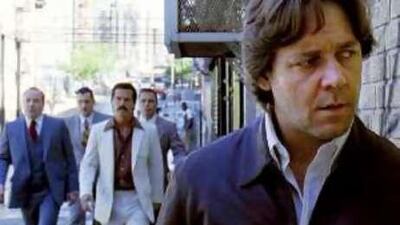In American Gangster, Frank Lucas, played by Denzel Washington, is the epitome of the American success story. He recognises a gaping hole to be filled in the business world and proceeds to fill it by importing a product that he buys directly from its source, bypassing middle men and putting a higher-quality product on the market for a lower price. To ensure customer loyalty, Lucas brands his product Blue Magic and enforces strict pricing and quality controls among his distributors.
If it weren't for the fact that the product was heroin, Lucas would be the perfect MBA candidate. Ridley Scott's American Gangster is based on the true story of a Harlem drug pin and has been compared to The Godfather. Lucas brings his family into the business, is a magnanimous benefactor of his Harlem neighbourhood and reacts ruthlessly when crossed, calmly getting up from his daily breakfast at a local cafe to shoot a man to death on a street corner in broad daylight. He is so beloved, and feared, that he knows he will get away with it.
But American Gangster tells two stories: one is the tale of the underling who fights his way to the top of the crime world; the other is of an achingly principled cop, Detective Richie Roberts (Russell Crowe), who makes it his life's quest to track down Lucas. Roberts is an outcast in the police department. He is mistrusted by beat cops and higher-ups because he found $1 million in drug money during an investigation and, instead of divvying it up among his colleagues, turned it in. In large part, the highest hurdles preventing Richie from nabbing his quarry come from inside his own department, especially from a scary Josh Brolin (whose performances in this film, the Coen brothers' No Country for Old Men and the current W. have nudged him into the upper echelon of American actors) in the role of Detective Trupo, who demands a cut of every drug deal that goes down on his turf. Mainly because of Trupo, viewers are cheering for Lucas by the end of the movie.
A pariah in the precinct, Roberts makes for a sharp contrast to Lucas, who is beloved by those he works with. He lives an admirably low-key life, doing everything not to call attention to himself or his criminal activities. His wife loves him. He takes his mother (Ruby Dee) to church every Sunday. Roberts, on the other hand, is in the midst of a divorce from a nagging wife, and his mother is not so much as mentioned in the film. The bad guy has it all. The good guy has nothing.
American Gangster is certainly an epic tale of success in America on the order of The Godfather, but with shades of Serpico, Goodfellas and countless other gangster movies colouring it at every turn. The conflict of personality and wits, with one character relying on his inner compass in the face of withering pressure, is old terrain for Scott. As far back as 1977, he explored such issues with The Duellists in which Keith Carradine is obliged to hunt down Harvey Keitel in Napoleonic times, finally fulfilling his obligation by refusing his social license to gun him down. Similar conflicts are portrayed in Scott's Alien, Blade Runner, Gladiator and even Thelma and Louise. In all of these films, the personal conflicts are set against overpowering social, historical and political backdrops that force a protagonist's hand but against which the protagonist rebels in favour of his or her own character.
The DVD release comes with a number of extras, including an alternate ending to the one that cinemagoers saw last year. I'll opt for the engrossing face-to-face with Lucas and Roberts sitting across a table from one another, two men who know the score and accept the conflict of their actions as the way of the world. It is a bit like two Wall Street brokers on the opposite side of a coveted deal.
jsipe@thenational.ae

